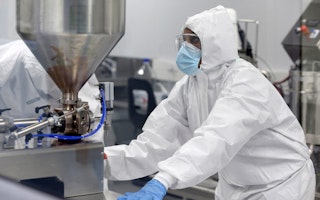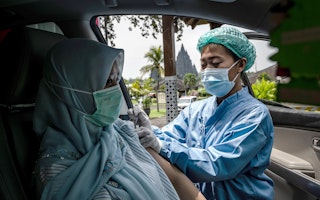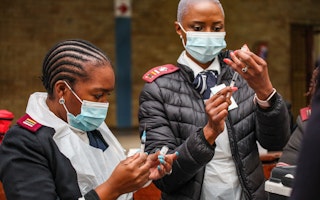Q&A: How Open Access Can Help Defeat COVID-19

The way scientists have openly shared research and data to respond to the COVID-19 pandemic could also help speed progress on other deadly diseases—including cancer, Parkinson’s, and Alzheimer’s. Melissa Hagemann, of the Open Society Information Program, speaks to Heather Joseph, the executive director of SPARC, about how the race for the cure to COVID-19 could point the way to further breakthroughs.
You’ve said that scientific publications have “broken the glass” when it comes to research on COVID-19. What do you mean by that?
That’s right. Normally, an awful lot of scientific research articles are hidden behind paywalls.
If I want to look at every article related to a topic I’m interested in, for example, I have to do a search to find out where they are, find a way to pay for them, and then manage permissions to determine what I can and cannot do with them. All of that takes time and limits the pool of people who can access research. As a result, scientific progress is slowed down.
But research on COVID-19 is different?
Yes. COVID-19 serves as a perfect test case to illustrate why we at SPARC believe that the immediate open sharing of research should be the norm for all science.
The publishing companies that normally earn money by selling access to this sort of research have dropped their paywalls on COVID-19–related articles. As a result, we are beginning to see huge—and rapid—progress towards a better understanding of the nature of the virus as well as how best to protect people from it.
What effect has that had on the discourse about COVID-19?
One of the things that COVID is showing us is that when scientists start openly pooling their data and articles, they start to have conversations about science in real time. Instead of waiting months for key findings to be published, scientists are sharing their findings on the sorts of channels many people use every day—such as Slack and Twitter.
A lot of the initial science for COVID started taking place on these kinds of social media and social platforms. While this was great, it also led to a few preprints with preliminary conclusions that were wildly incorrect. But because this happened in the open, the community quickly self-corrected. Problems were pointed out sometimes within 24 or 48 hours.
And that self-correction happened in real time, rather than happening behind closed doors over a period of months—or sometimes years, as is often the case with scientific journals.
How could this approach help against other diseases or scientific challenges?
When it comes to COVID, if we see scientists having success in mapping the virus’s genome and sharing that data openly, leading to potential targets for vaccines and treatments, then the same kind of open research pathways could also help make progress on cancer, or Alzheimer’s, or Parkinson’s.
And it also makes you think about all the other thorny scientific problems we’re facing—such as climate change, or sustainable food sourcing. We should consider applying the open-sharing of information to deal with these issues, too.
Is there a possible downside?
The big concern that we hear expressed about making open access the default for research tends to be centered on protecting the financial position of publishers. Right now, the publishing system is largely operated by commercial players, and their goals are not necessarily to serve humanity; they are to get their shareholders a certain return on their shareholders’ investment.
Many of the companies that are responsible for publishing scientific journal articles right now are throwing off profit margins of 30 to 40 percent. Is that really money well spent in science, or could that money be reinvested in additional (and faster) research?
What about the idea that these publications serve a positive role as gatekeepers who can discern between good and bad research?
There’s a kernel of truth there, of course. The validation of scientific research doesn’t happen by itself (or for free) and publishers play a role in making that happen. But there is also a fear factor here that deserves greater scrutiny.
One of the things that that COVID-19 pandemic is showing us, I’d argue, is that we don’t necessarily need journals or editors to communicate science in a high-quality way. What we’re seeing with COVID-19, in fact, is that the community acts the way the scientific community has always acted—just on different platforms and with much greater speed.
SPARC is a grantee of the Open Society Foundations.


